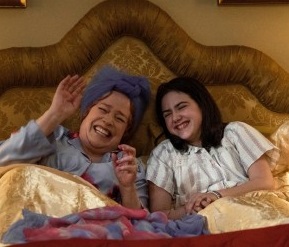Are You There, God? It’s Me, Margaret
 In 1970 New York, 11-year-old Margaret Simon’s parents announce the family will be moving to the New Jersey suburbs due to her father’s recent job promotion. But their downtown NYC apartment is the only home Margaret has ever known, and she doesn’t want to leave. While not far away geographically, New Jersey may as well be halfway around the world to Margaret.
In 1970 New York, 11-year-old Margaret Simon’s parents announce the family will be moving to the New Jersey suburbs due to her father’s recent job promotion. But their downtown NYC apartment is the only home Margaret has ever known, and she doesn’t want to leave. While not far away geographically, New Jersey may as well be halfway around the world to Margaret.
Fortunately, a neighbor girl named Nancy befriends Margaret as the family is still unpacking. Nancy invites Margaret into her click of close friends, and they inform Margaret about various classmates – who is the “hot” boy in their class, who is the loser boy, the slut girl, and so forth. Meanwhile, Nancy’s mother works with Margaret’s mother on the school PTA. Things are going well for Margaret, but she misses the city – particularly her paternal grandmother Sylvia.
Classic novel
By now, you may have discerned I am describing Kelly Fremon Craig’s new film, a motion picture adaptation of Judy Blume’s classic 1970 coming-of-age novel, “Are You There, God? It’s Me, Margaret.” Ironically, this story has never been made into a movie before, and I can’t help but wonder why not. Given the cynicism rampant in today’s society, “Are You There, God? It’s Me, Margaret” seems almost quaint – as though it’s set in another universe. And in a way, it is. Fortunately, Craig keeps the 1970 time period (and for once, selects supporting music from 1969 and ’70 – not from 1979, the way many recent films have done), which is a better fit for the innocence of the narrative.
The reality of adolescence
The middle school years are always difficult to navigate – in person and in the movies. But Craig (who adapted Blume’s source material) captures the reality of adolescence as well as anyone. Recall that her first film was 2016’s “The Edge of Seventeen,” based on her original screenplay. In “Are You There, God?”, the girls run through a yard sprinkler like small children one minute, then discuss bras, chest sizes, and their forthcoming periods the next. It is this naivete that makes “Are You There, God?” so endearing.
Milquetoast character
My only real complaint about this picture is Margaret, played by Abby Ryder Fortson. Much as with the Kevin Arnold character on “The Wonder Years,” Margaret is merely a window through which we view everything and everyone around her. Margaret floats from one person or concern to another without ever affecting her own trajectory. In this sense, she’s like a dog; a dog is always ready for the next activity, but almost never initiates any activity on its own. I realize this technique often works perfectly in literature, but it can be problematic on film. By contrast, Hailee Steinfeld’s lead character in “Edge of Seventeen” was headstrong, brash, unique, and memorable. But again, that was an original screenplay. Margaret is milquetoast. Consequently, “Edge of Seventeen” was a star-making picture for Steinfeld; “Are You There, God?” will not be for Fortson.
Respect of religion
On the other hand, “Are You There, God?” succeeds in presenting a film in which religion (and the observation of religion) is not only a major part of the story, but it is treated with the respect it deserves, and not lampooned. Margaret laments to her teacher, Mr. Benedict (Echo Kellum), that she despises religious holidays because her father is Jewish and her mother Christian. Consequently, the Simon family chooses not to celebrate any such observances. Mr. Benedict smartly assigns a year-long term paper project to Margaret on the practice of religion. He ignites in young Margaret a spark to gain an understanding of something sorely missing in her life. She begins verbally communicating with God. At first, her requests are self-serving and humorous – such as begging His help in producing her first period.
 Exploration of various religions
Exploration of various religions
But the assignment causes Margaret to accompany her Aunt Sylvia to temple one Saturday – much to Sylvia’s delight. Played to the hilt by the great Kathy Bates, Sylvia then considers Margaret Jewish. But without any advance knowledge of the Jewish service, Margaret is perplexed by the frequent use of Hebrew, as opposed to English. She also finds it difficult to sit still for two hours, even with her beloved grandmother.
Later, she accompanies an African American friend to her church, where Margaret enjoys the happiness of the music. Margaret also joins Nancy’s family for a Christmas Eve service. And later finds herself in a confessional booth at the Catholic church of the so-called “slutty” girl. This exploration of religion through the innocent eyes of a girl never exposed to anything spiritual is both refreshing and welcoming.
Most influential character
However, we are also exposed to the darker side of religious observation. We learn Margaret’s devout Christian maternal grandparents essentially disowned their daughter upon her decision to marry a Jewish man. Played by Rachel McAdams, Margaret’s mother is perhaps the single most influential character in the entire film. And that’s refreshing too, since most coming-of-age teen films place the “best friend” character in this important role.
Outstanding song placement
I must also mention that while I typically dislike the use of existing music in motion pictures, “Are You There, God?” features the best use of a song I’ve seen in years. At a game of spin-the-bottle, Margaret accompanies the good-looking hunk boy for their “two minutes in the closet” to the playing of Dusty Springfield’s “Son of a Preacher Man.” Absolutely perfect!
Best teen film of the ’20s
“Are You There, God? It’s Me, Margaret” is a good, faithful adaptation of one of most popular teen novels in history. I can’t put it in the same class as “Edge of Seventeen” or Bo Burnham’s “Eighth Grade,” but Craig is limited by the constraints of the source material. “Are You There, God?” was never going to rise to that level. But acknowledging this fact, Craig has churned out the best teen film I’ve seen so far this decade. And since 2023 is our fourth year in, that’s impressive.
Andy Ray‘s reviews also appear on https://youarecurrent.com/category/nightandday/film-reviews/.